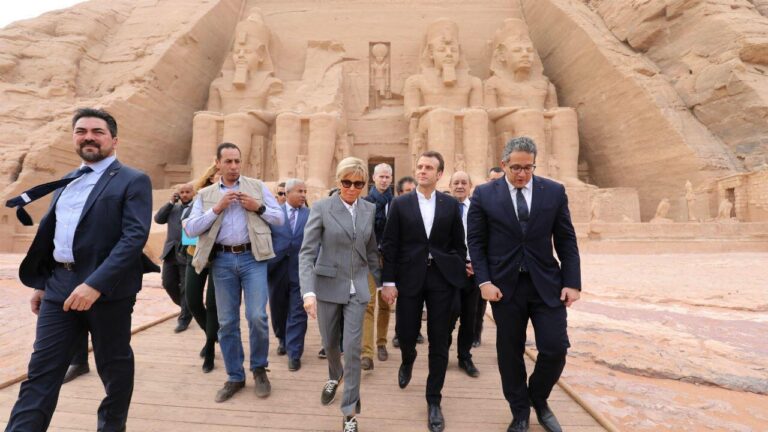French President Emmanuel Macron is set to travel to Egypt on Monday to support efforts aimed at brokering a ceasefire in Gaza, amid escalating violence in the region. The visit underscores France’s active role in seeking a diplomatic resolution to the conflict, as international leaders rally to contain the crisis and push for renewed dialogue between the involved parties. MacronŌĆÖs trip to Cairo comes at a critical juncture, with intensified calls for an immediate halt to hostilities and humanitarian aid access in Gaza.
MacronŌĆÖs Mission to Egypt Aims at Strengthening Gaza Ceasefire Efforts
French President Emmanuel Macron is set to embark on a critical diplomatic mission to Cairo this Monday, underscoring FranceŌĆÖs active involvement in seeking a sustainable ceasefire between Israel and Gaza. His visit aims to rally regional leaders and international partners around a unified strategy to halt ongoing hostilities and mitigate civilian suffering. Macron’s diplomatic efforts are expected to focus on solidifying commitments and exploring pathways for humanitarian aid access within the blockaded Gaza Strip.
Among the priorities of Macron’s discussions will be:
- Coordinating with Egyptian authorities to maintain open channels for ceasefire negotiations
- Enhancing support measures for displaced civilians in the region
- Reinforcing France’s role as a mediator in Middle East peace talks
- Addressing security concerns that fuel recurrent escalations
| Stakeholder | Role | Expected Outcome |
|---|---|---|
| Egypt | Host and mediator | Facilitate negotiations, secure border stability |
| France | Diplomatic facilitator | Coordinate international pressure, support humanitarian aid |
| Palestinian Authorities | Ceasefire party | Commit to ceasefire terms, manage local response |
| Israel | Ceasefire party | Agree to halt hostilities, ensure civilian protections |
Key Challenges Facing Diplomatic Talks on Gaza Stability
Diplomatic efforts aimed at stabilizing Gaza face a complex web of obstacles, with deep-seated mistrust among parties topping the list. Ceasefire negotiations are continually hampered by divergent political agendas and historical grievances that fuel skepticism on all sides. Additionally, the fragmented nature of governance within Gaza complicates direct communication, as various factions hold differing stances on what a sustainable peace agreement entails. External actors often disagree on terms, further stalling progress and increasing the risk of sporadic violence undermining diplomacy.
The humanitarian crisis adds an urgent dimension, as international stakeholders push for urgent relief access while ensuring security concerns are addressed. This creates a diplomatic balancing act where opening humanitarian corridors must avoid empowering militant groups or exacerbating tensions.
Key challenges include:
- Reconciling political divisions between Palestinian groups and Israel
- Addressing the impact of external regional interests
- Ensuring enforcement mechanisms for any ceasefire deal
- Maintaining momentum amid fluctuating conflict dynamics
| Challenge | Impact | Potential Solution |
|---|---|---|
| Mutual Distrust | Delays negotiations | Third-party mediation |
| Humanitarian Access | Human suffering intensifies | Secured aid corridors |
| Factional Divisions | Unstable ceasefire | Inclusive talks |
Implications of FranceŌĆÖs Involvement for Regional Security
FranceŌĆÖs active diplomatic engagement in the Gaza ceasefire negotiation underscores its evolving role as a peace broker in the Middle East. By directly involving itself in sensitive negotiations alongside Egypt, Paris signals a commitment to stabilizing a region long plagued by conflict and unrest. This move not only strengthens FranceŌĆÖs geopolitical influence but also enhances its ability to collaborate with regional powers, fostering multilateral efforts that could deter the escalation of violence across neighboring states.
- Reinforcement of diplomatic ties: France’s partnership with Egypt and other regional actors boosts mutual trust and coordination.
- Counterterrorism cooperation: Enhanced dialogue may facilitate joint initiatives against extremist groups exploiting the conflict.
- Humanitarian impact: Support for a ceasefire could open corridors for aid delivery, reducing civilian suffering and fostering stability.
| Aspect | Potential Outcome | Impact Level |
|---|---|---|
| Diplomatic Alignment | Enhanced multilateral cooperation | High |
| Security Collaboration | Improved intelligence sharing | Medium |
| Humanitarian Access | Increased aid delivery efficiency | High |
Recommendations for Sustained Peace and Humanitarian Access in Gaza
To ensure lasting peace and guarantee unhindered humanitarian access in Gaza, it is essential to prioritize diplomatic engagement and multilateral cooperation. Key international players must support a sustainable ceasefire by facilitating continuous dialogue between conflicting parties, coupled with robust monitoring mechanisms to prevent escalations. Additionally, strengthening the role of neutral humanitarian organizations will be vital to coordinate aid deliveries effectively and ensure that relief reaches all affected populations without obstruction.
Practical measures focus on rebuilding critical infrastructure and creating safe corridors for humanitarian convoys. Recommended actions include:
- Establishing a joint ceasefire monitoring committee with international observers.
- Securing commitments from all parties to respect humanitarian zones.
- Coordinating with regional stakeholders to enhance border management and expedite aid.
- Supporting local governance structures to stabilize essential services.
| Action | Purpose | Responsible Parties |
|---|---|---|
| Ceasefire Monitoring | Prevent conflict resurgence | UN, Regional Allies |
| Humanitarian Corridor | Safe aid passage | Egypt, Gaza Authorities |
| Infrastructure Rehab | Restore essential services | International Donors, NGOs |
Closing Remarks
As President Emmanuel Macron travels to Cairo to support efforts aimed at achieving a ceasefire in Gaza, the international community watches closely, hopeful that diplomatic initiatives will pave the way for a halt to the ongoing conflict. FranceŌĆÖs engagement underscores the urgent need for dialogue and cooperation among regional and global actors to restore stability and address the humanitarian crisis in the region. Further developments are expected as negotiations continue in the coming days.




